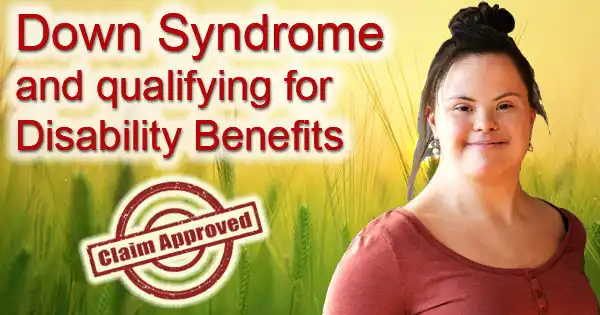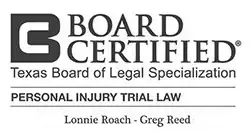Down Syndrome and Qualifying for Social Security Disability Benefits
Can someone suffering from the effects of Down Syndrome qualify fordisability benefits?
Author: Attorney Lloyd Bemis
Updated: 8/8/2023
Summary: Can I get disability benefits if I am suffering from the effects of Down Syndrome?
First you must meet the SSA’s financial requirement: You must have worked long enough, recently enough, and not made over a predetermined level of income.
Second you must meet the medical requirements:
To qualify for benefits for non-mosaic Down syndrome, applicants must provide medical evidence of their diagnosis, typically through a karyotype test, which analyzes chromosomes in a blood sample. Acceptable documentation includes a signed karyotype test, an unsigned test accompanied by a doctor’s statement, or a doctor’s report based on distinctive physical characteristics and prior testing.
Individuals with mosaic Down syndrome must present medical evidence of functional limitations and a doctor’s diagnosis. Your symptoms and limitations may be as severe as other Blue Book impairments and Social Security may find you disabled based on related listings.
Down syndrome (or Trisomy 21) is a genetic disease which happens when abnormal cell division results in an extra copy of chromosome 21. This extra genetic material results in the physical and cognitive features that are seen in people with Down syndrome. Down Syndrome is the most common chromosomal condition in the United States with approximately one in 700 babies born with Down Syndrome. Down Syndrome is a condition, not a disease, and many people with Down syndrome live happy, active lives. If you are suffering from the effects of Down Syndrome you may qualify for disability benefits.

If you are or someone you know is suffering from the effects of Down syndrome and have been denied disability don’t give up, almost 70% are denied initially! Just call 512-454-4000 for a free, no obligation consultation to learn what the options are.
There are two main types of Down syndrome: non-mosaic and mosaic.
In non-mosaic Down syndrome, every cell has an extra 21st chromosome, while in mosaic Down syndrome, only some cells have an extra chromosome. Non-mosaic Down syndrome is the most common form in 96% of people with Down syndrome. Individuals with mosaic Down syndrome have less severe intellectual and developmental problems and may be less likely to be disabled.
Though many people with Down syndrome have few significant health problems, Down syndrome can lead to a variety of complications, some of which can become more problematic as a person ages.
These complications include:
- Heart defects
- Immune system disorders
- Gastrointestinal problems
- Spinal problems
- Sleep apnea
- Leukemia
- Hearing loss
- Eye diseases
- Obesity
These conditions and accompanying symptoms can affect your ability to maintain employment.
Does Down syndrome qualify as a disability for SSDI?
Down syndrome can cause a variety of cognitive and physical limitations which may prevent a person from working full-time and affect them throughout their life.
If you have non-mosaic Down syndrome:
Social Security has created a manual called the Blue Book which lists impairments Social Security considers disabling and may automatically qualify for benefits. Social Security recognizes non-mosaic Down syndrome as a disabling disorder under Section 10.06. To qualify under this listing, applicants will need to provide Social Security with medical evidence supporting a Down syndrome diagnosis. Social Security bases a diagnosis of Down syndrome on a karyotype test, a test that uses a blood sample to check the number, length and shape of chromosomes in a sample of blood cells. Social Security will want to see:
- A karyotype test signed by a doctor; or
- An unsigned karyotype test with a statement by the doctor that you have Down syndrome; or
- A doctor’s report diagnosing you with Down syndrome based on distinctive physical characteristics and a prior karyotype test.
If you don’t have a karyotype test, Social Security will also accept a doctor’s report diagnosing you with Down syndrome based on physical features and functional limitations often found in Down syndrome patients such as difficulty with speech. Social Security considers people born with non-mosaic Down syndrome disabled from birth.
If you have mosaic Down syndrome:
Applicants with mosaic Down syndrome may or may not qualify for disability benefits, depending on the severity of their disorder. If you have mosaic Down syndrome, you will need to provide Social Security with medical evidence of your functional limitations, as well as a doctor’s diagnosis. People who have mosaic Down syndrome display many of the same cognitive and physical limitations as those with non-mosaic Down syndrome. Your symptoms and limitations may be as severe as other Blue Book impairments. and Social Security may find you disabled based on related listings. Some medical conditions that are often present in people with mosaic Down syndrome include:
- Hearing loss
- Sleep—related disorders
- Intellectual disorders
- Eye diseases.
Individuals with mosaic Down syndrome may not be considered disabled under Social Security’s strict requirements, but Social Security may, however, award benefits if you are not physically or mentally capable of full-time work.
Complications resulting from Down syndrome can affect your ability to do physical work or sedentary work. Heart problems may make you short of breath; you may have difficulty speaking or have memory and concentration problems. Social Security will conduct a Residual Functional Capacity (RFC) assessment to evaluate your physical and mental capabilities to determine if there is any job you can do, taking into consideration your age, education and whether or not you can drive. If Social Security decides you there are no jobs you can do given your limitations, you may be approved for a Medical-Vocational Allowance.
If you are 55 or older or have another medical condition you may get approval.
Social Security follows a set of rules to determine when the agency expects an applicant to learn a new job.
Applicants who are 55 or older often fall under a grid rule, which means they are not expected to learn a new job. For example, a 55-year-old applicant with no transferable skills might be found disabled. If you can’t go back to your old job, and you don’t have the skills to learn a new one, Social Security will likely grant you disability benefits.
You may also be eligible for Social Security Disability benefits if you have another medical condition.
Down syndrome often leads to other impairments such as hearing loss or gastrointestinal problems. One disorder alone may not meet the criteria of an impairment as stated in Social Security’s Blue Book, but if you have more than one medical condition, Social Security must consider how those health issues combined limit your ability to hold a job and perform necessary daily tasks.
Social Security also has basic financial requirements.
Before you are eligible for Social Security disability benefits, you must satisfy some basic financial requirements.
Social Security provides two types of disability benefits: Social Security Disability Income (SSDI) and Social Security Income (SSI). To qualify for SSDI, you must: 1) have a disability that has lasted or is expected to last 12 months; and 2) you must have worked in a job where you paid Social Security taxes long enough and recently enough; and 3) you must not earn more than Substantial Gainful Activity (SGA), which is $1,620 per month in 2025 for nonblind applicants and $2,700 per month for blind applicants.
According to a 2015 survey, only 3% of people with Down syndrome were employed full-time.
Most worked part-time or did volunteer work and did not have enough work credits to qualify for SSDI. If you haven’t worked long enough to earn enough work credits, or if you earn too much income, you may be eligible for disability benefits through SSI. SSI is a program that pays monthly benefits to people with limited income and resources who are disabled, blind, or age 65 or older. SSI is based on income instead of work credits, and is financed by general funds of the U.S. Treasury.
I have long-term disability insurance – should I file a claim?
Long-term disability insurance (LTD) is coverage that protects your income if you are unable to work due to illness or injury and is purchased as part of a group employment plan or privately through an insurance company.
Policies pay between 50-60% of your salary and benefits continue until you return to work or for the number of years stated in the policy. If you have long-term disability insurance, you should file a claim as soon as you become disabled. However, LTD coverage is good only as long as you are employed, so do not quit your job before you file a claim, and be sure to check your policy’s definition of “disabled” as each policy will state the definition of “disabled” which is in use. Additionally, be aware that long-term disability insurance companies can require a claimant to also apply for Social Security Disability benefits.
How do I file for Social Security Disability benefits?
You can apply for Social Security Disability benefits online, over the phone, or in person at your local Social Security Administration office.
If your initial application is denied, don’t be discouraged because most are, and you will have the opportunity to appeal. There are four steps to the Social Security appeal process:
- File a Request for Reconsideration with the Social Security Administration to completely review the case.
- If you don’t agree with SSA’s response to your Request for Reconsideration, you can request a hearing before an Administrative Law Judge (ALJ). ALJs are attorneys who work for the Social Security Administration; they review SSDI cases and either uphold or overturn decisions to deny SSDI benefits. If you are not represented by an attorney at this point, now is the time to obtain legal counsel. This is a critical point in the process and will raise your chance for success.
- If an ALJ does not grant your claim, you can request that the Appeals Council review your case.
- Federal Court review. The final step in the appeal process is filing suit in U.S. District Court.
Do I need a disability attorney for SSDI?
If you have Down syndrome and cannot work, you may be eligible for Social Security Disability benefits, but qualifying is complicated and applying for SSDI is a long process that can take several months to years.
Also, if you experience cognitive difficulties, the application process may be particularly challenging. Your chances for approval are increased significantly if you have legal representation. At each potential stage of the process, from the initial application stage, the reconsideration stage and the ALJ hearing stage, an attorney can assist you in completing the detailed forms and questionnaires required by Social Security, collecting and submitting relevant medical evidence, and preparing questionnaires for your doctors. At the ALJ hearing phase an attorney will not only continue to assure that the evidence is complete, but prepare you for questioning by the ALJ, prepare an argument on your behalf and question any doctors or vocational experts selected by the ALJ to testify at the hearing. At the Appeals Council and federal court level, a lawyer can present legal arguments to show your case was wrongfully denied. Fees charged by disability attorneys are regulated by federal law and are usually 25% of disability backpay you are owed. There are no out-of-pocket costs, and if you don’t win your case, you won’t be charged anything.
Do I need a disability attorney for a long-term disability insurance claim?
Whether you have a long-term disability insurance policy purchased through a private insurance broker or a group policy purchased with your employer, filing a claim for long-term insurance is a complex process.
The wording of LTD policies can be confusing and the laws and regulations which affect the two types of LTD insurance differ in their procedures for filing claims and appeals. An experienced LTD attorney with thorough knowledge of ERISA laws and regulations will avoid mistakes and increase your chance of success. An attorney will act on your behalf, completing your application and filing your claim in a timely manner. They can also negotiate a settlement or file an appeal for you. If it becomes necessary to file suit, an LTD attorney can prepare your case against an insurer. Most LTD attorneys handle cases on a contingency basis and charge approximately 25%-40% of a claimant’s past due benefits. You do not pay an attorney’s fee unless the attorney wins your case.
At The Texas Disability law firm Bemis Roach & Reed, our attorneys are committed to helping injured or disabled clients receive the benefits they deserve. Mr. Roach is AV Preeminent and SuperLawyers rated and has become a recognized leader in the field of Long Term Disability law. Mr Bemis focuses his practice on Social Security disability while Mr Reed handles both LTD and SSDI claims. Both are AV Preeminent and SuperLawyers rated and all our attorneys have been successfully helping people fight for their rights against big insurance companies and the government since 1993. If you have applied for benefits and been denied call 512-454-4000 for a free consultation and get help NOW.
Social Security Disability Benefits for Children With Disabilities
Can a Spouse get Disability benefits
What if the SSDI beneficiary is not capable of managing their benefits?


Your Free Initial Consultation
Call now:
At Bemis, Roach and Reed, if we can't help you, we will try to find the right attorneys for you.
We offer each of our prospective clients a free no obligation one hour phone or office consultation to see if we can help you and if you are comfortable with us. We know how difficult a time like this can be and how hard the decisions are. If we can be of assistance to you and help you find a solution to your issue we will, even if that means referring you to another attorney.
Let's get you Started:
If you could provide us with some basic information about your claim we will get right back with you with a free case evaluation and schedule your Free Consultation Today.
You can also email us at: contact@brrlaw.com
Kind Words from Our Clients
“The attorneys and staff at Bemis, Roach & Reed have provided me and my husband, Jeff, with stellar advice, care, and service. They made navigating the SSDI process easy, painless, and as timely as possible. During this difficult time in our lives it was a tremendous relief to know they were on our side and keeping us updated on next steps and timelines. We also had questions about my husband’s long term disability insurance and they helped us get those questions answered and resolved without any additional fee. I highly recommend Bemis, Roach & Reed.” – Kelli G
“I needed a lawyer for my case and had googled best lawyers. They came up first on my list and decided to give them a call. From the moment I called I knew I chose the right people. They said they would fight for me and fight they did. They knew what they were doing and kept good communication throughout the process. If you need someone that will listen, understand, and fight then these are the people. HIGHLY RECOMMEND.” – Marcel L.
“I’ve had a great experience working with Bemis, Roach & Reed for my disability case. I spent two years fighting on my own, until I was informed to look for a disability lawyer. Right away, sending in questions was a breeze, and from the moment my case was accepted, everything became a major weight off my shoulders. My newest appeal was filed for me, my medical records and case history sorted for me, and I could finally focus on my appointments and treatment with a little less worry. Everything was explained to me in a way that made sense, the process was set out in an easy to understand way. And, just like that, at the beginning of July 2023, my claim was accepted!” – Sunshinemutt






